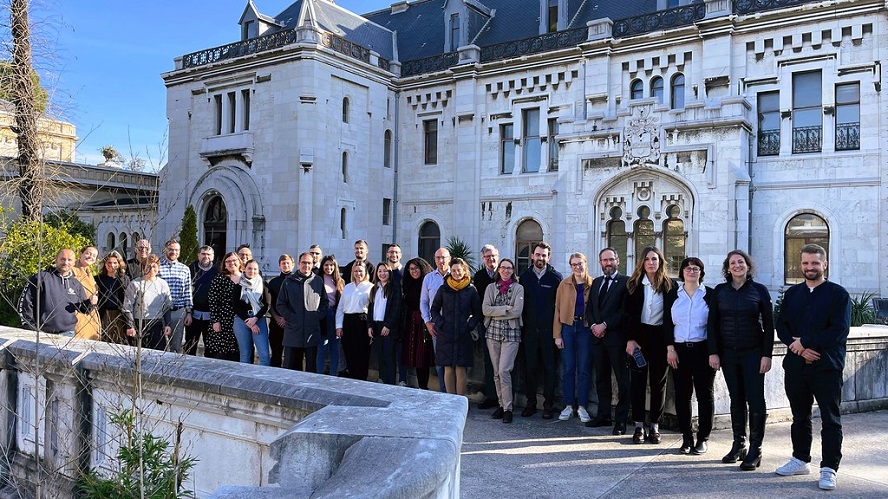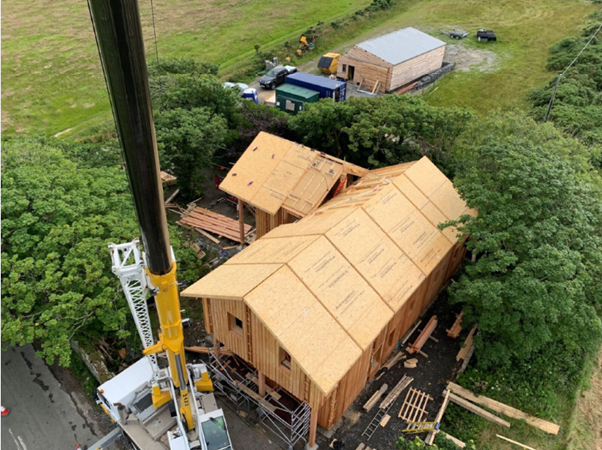Natural and recycled resources that could become the building materials of the future including prefabricated wall panels made from waste wood and insulation made from fungal mycelium are set to be tested by University of Bath researchers in a major European project.
The Horizon Europe project INBUILT, which launched this week, has an ambitious mission to advance sustainable building practices across the continent. The project's goal is to significantly reduce the carbon footprint of buildings throughout their entire life cycle by introducing innovative products and systems.
Researchers from Bath’s Department of Architecture and Civil Engineering will carry out work to test a range of new natural and bio-based materials, seeking to understand their suitability as building materials, as well as carrying out analysis of their environmental impacts throughout their life cycle.

Dr Steve Allen, Associate Director of Bath’s Institute for Sustainability who is leading the University’s part of the INBUILT project, says: “At Bath we are well-known for our capability and work characterizing new materials, while understanding the commercial and practical reality of the ways in which they will be used. Also key to this work is the life cycle assessment we will also carry out, to understand and minimise the environmental footprint of each product.”
Life cycle assessment involves building an understanding of the processes at each step of a material or product’s creation, use and disposal, and monitoring the associated emissions and environmental impacts of these processes. This assessment informs decision-making related to which materials or products perform best from an environmental standpoint.
As well as the assessment, Bath researchers will also work to reduce environmental impacts of the construction products, by co-developing and optimizing production processes.
Dr Allen adds: “Carrying out work that will help transform the construction industry to become more sustainable is an exciting prospect, with potential for huge positive impact.”
INBUILT's strategy involves the development and demonstration of 10 innovative products and systems, including large-sized rammed earth blocks, recycled fired and non-fired bricks, hybrid straw-clay boards, recycled concrete and recycled concrete blocks, prefabricated waste wood external and internal wall elements, smart windows with recycled glass and bio-PUR frames, bio-based prefabricated curtain walls, recycled waste paper and textile fibre insulation mats, bio-based recycled insulation sheet panels/infill and second life photovoltaic panels.
Four demonstration buildings will be built across Europe – one in the UK – to carry out the experimental tests.
Project Coordinator Professor Erwin Franquet from the Université Côte d'Azur adds: “These innovative solutions are pivotal in our journey towards sustainability, using locally sourced bio- and geo-materials as well as reused and recycled elements to mitigate the construction sector's impact on greenhouse gas emissions”
A key feature of the INBUILT project is the integration of a digital platform employing a Building Information Modelling (BIM)-based approach. This platform will streamline the construction projects' entire lifecycle, from design to end-of-life, and is enhanced by Integrated Project Delivery (IPD). INBUILT's approach will be demonstrated in real-world settings across France, the UK, and Germany, showcasing its viability and adaptability.
The project emphasises a shift from traditional construction models to more sustainable and efficient methods. This change is vital for aligning with Europe's sustainability objectives and conserving resources. INBUILT will not only focus on new construction but also on renovating existing structures to enhance productivity and competitiveness in the construction industry.
Coordinated by the Université Côte d'Azur, the INBUILT project involves a consortium of 16 partners, including researchers, architects, and technology providers. The project, which formally started in December 2023, will run until May 2027. It is funded with €7.3 million (£6.2 million) from the EU’s research and innovation programme Horizon Europe within the Built4People partnership, which brings together the whole construction value chain to accelerate people-centric innovation for a sustainable built environment.
Bath researchers working on INBUILT are Dr Steve Allen (Principal Investigator), Dr Valeria Cascione, Dr Dan Maskell, Dr Andy Shea, Prof Pete Walker.




















